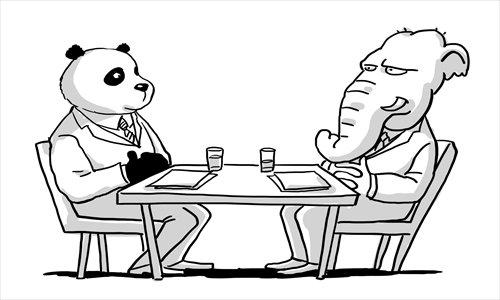Li’s Indian visit may be thorny but fruitful

Chinese Premier Li Keqiang has chosen to make India the destination of his maiden overseas visit. This deft diplomatic symbolism has not been lost on India because Li, who is scheduled to be in Pakistan on Wednesday after winding up his current India visit, could have just reversed his itinerary and come to India after completing the Pakistan leg of his tour.
Li's current India visit is extremely significant as it marks the first top level bilateral visit from the fifth generation of Chinese leadership that took over just about two months ago after the once-in-a-decade leadership transition. The two sides have accorded it the highest diplomatic protocol and characterized it as a "State visit."
Though several agreements will be inked after Li's talks with his Indian counterpart Manmohan Singh, the visit is essentially exploratory. The two principals would be meeting face-to-face for the first time since the Ladakh face-off that was resolved only earlier this month.
The two leaders are likely to focus on how to maximize their complementarities and deal amicably with contentious issues that have unfortunately snowballed. They cannot be oblivious to the reality that more than half a century after China's easy victory in the border war, the two sides still share a tenuous relationship where they view each other more as adversaries than rivals.
Yet India and China, which account for 40 percent of the world's population, have a lot to offer to each other and could be a vital instrument in each other's growth. Indian Prime Minister Manmohan Singh has famously said that "the world has enough space for the growth ambitions of both countries."
Li's interactions with the entire Indian political spectrum should be within the ambit of Chinese President Xi Jinping's "five-point proposal" for Sino-Indian relations. Xi's proposals are highly significant as they update the more than half a century old Panchsheel (five principles) that have thus far been the cornerstone of Sino-Indian bilateral relations.
Xi's five-point proposal for Sino-Indian bilateral ties is as follows: maintain strategic communication and healthy bilateral relations; harness each other's strengths and expand cooperation in infrastructure, investment, and other areas; deepen cultural ties and increase mutual understanding and friendship; expand coordination and collaboration in multilateral affairs to safeguard developing countries' legitimate interests and address global challenges; and accommodate each other's core concerns and reconcile bilateral disagreements amicably.
The two sides have been trying to do their best to come up with concrete deliverables on the first four points. In fact, the first was implemented to the hilt during the 20-day-long Ladakh face-off as the two sides stayed engaged through flag meetings between the local military commanders as well as diplomatically.
It is the last point that is rather nebulous. China-watchers in the Indian government feel that Beijing has constantly been shifting the goalposts as far as its "core concerns" are concerned. It began more than half a century ago with two T's, Tibet and Taiwan. Now the South China Sea has been added to that list.
India has also been raising the issues of Pakistan troops' presence in the Karakoram region of Pakistan and the Chinese policy of issuing stapled visas to residents of India-administered Kashmir while issuing normal visas to residents of Pakistan-administered Kashmir, thus taking sides on the dispute.
There will be a joint declaration at the end the of Li-Singh talks. It will be interesting to see the tone and tenor of the document and whether it carries a clause that India adheres to a one-China policy, once usual but omitted during a December 2010 visit by then Chinese premier Wen Jiabao.
China had just upped its ante in Kashmir from the Indian perspective. The ground situation still remains the same in this context.
The author is a New Delhi-based journalist-author and a strategic analyst. bhootnath004@yahoo.com